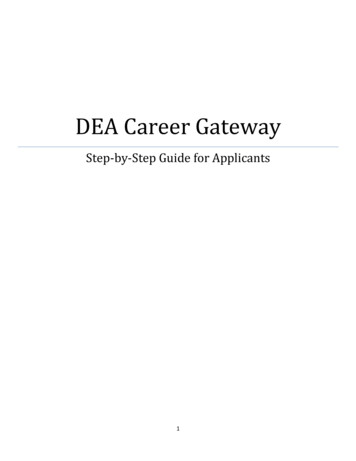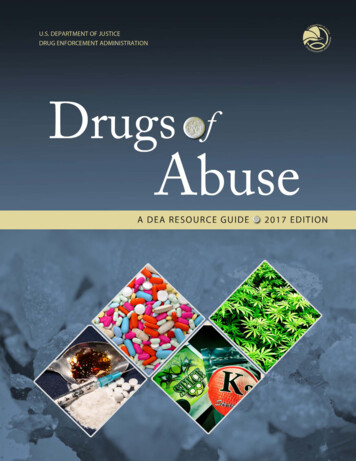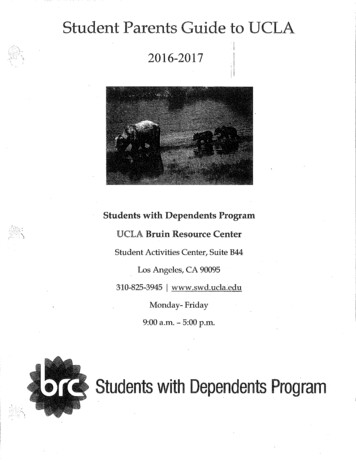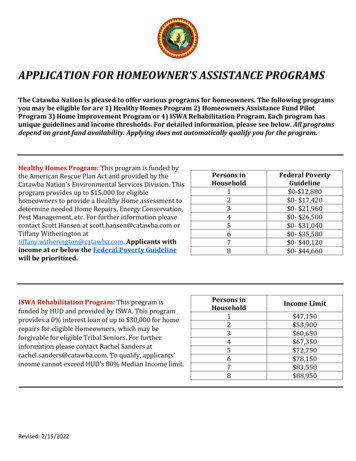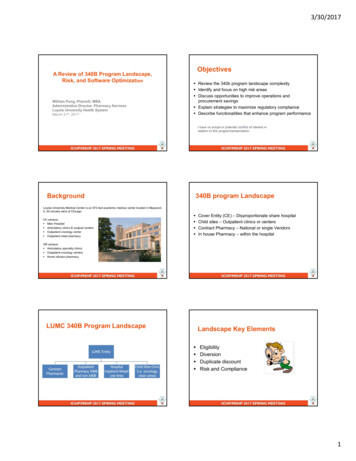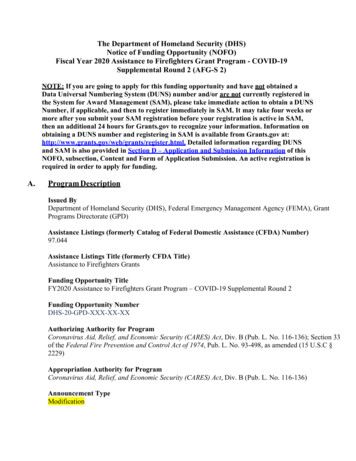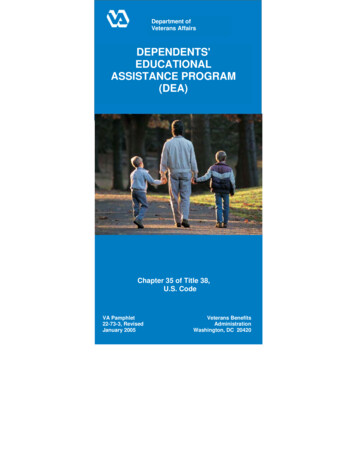
Transcription
Department ofVeterans AffairsDEPENDENTS'EDUCATIONALASSISTANCE PROGRAM(DEA)Chapter 35 of Title 38,U.S. CodeVA Pamphlet22-73-3, RevisedJanuary 2005Veterans BenefitsAdministrationWashington, DC 20420
Information in this pamphletwas current as of publication.Check www.gibill.va.gov forthe most current information.
C O N T E N T SINTRODUCTION . 1PART 1: ELIGIBILITY. 1ARE YOU ELIGIBLE? . 1HOW LONG CAN YOU RECEIVE BENEFITS?. 2ELIGIBILITY PERIOD: SON ORDAUGHTER . 2How Long Are You Eligible? .2Effect of Your Active Duty onYour Eligibility .2Other Extensions of YourEligibility Period .3Circumstances Beyond Your Control .3While in Training .4If You Marry.4ELIGIBILITY PERIOD: SPOUSE. 4How Long Are You Eligible? .4Veteran’s Disability .4Service Member Held Captiveor Missing .4Effect of Divorce on Your Eligibility .5Effect of Your Active Duty onYour Eligibility .5Other Extensions of YourEligibility Period .5Disability.5While in Training .5ELIGIBILITY PERIOD:SURVIVING SPOUSE . 6How Long Are You Eligible? .6Veteran Died of Service-ConnectedDisability .6Veteran Had Permanent and TotalService-Connected DIsability atTime of Death.6Veteran Died on Active Duty .6Effect of Your Active Duty onYour Eligibility .6i
ELIGIBILITY PERIOD: SURVIVING SPOUSE(Cont.)Other Extensions ofYour Eligibility Period. 7Disability .7While in Training .7If You Remarry.7Before Age 57 .7After Age 57 .8YOUR ENTITLEMENT: HOW MANY MONTHSOF BENEFITS CAN YOU RECEIVE? . 8Effect of Your Active Duty on YourAvailable Months of Benefits .9How Do We Charge You for Use ofBenefits? .9CAN YOU BE ELIGIBLE FOR MORE THANONE VA EDUCATION BENEFIT?. 10WHAT IF YOU RECEIVE OTHER VABENEFITS AS THE VETERAN’SDEPENDENT? . 11PART 2: TRAINING . 11WHAT TRAINING CAN YOU TAKE? . 11Can You Receive Special RestorativeOr Specialized Vocational Training?. 13Can You Receive Benefits for a Testfor a License or Certification? .13Can You Receive Benefits for TestsRequired for Admissions toCertain Programs? .14Can You Receive Benefits for Tests forCourse Credit at Colleges andUniversities?.14Can You Receive Benefits for Remedial,Deficiency, or Refresher Training? . 14Can You Receive Tutorial Assistance? . 14Can You Receive Work-Study Benefits?.15WHAT ARE RESTRICTIONS ON TRAINING?.16CAN YOU RECEIVE COUNSELING?. 17CAN YOU GO PART-TIME? . 18CAN YOU CHANGE PROGRAMS?. 18MUST YOU MAINTAIN SATISFACTORYATTENDANCE, CONDUCT, ANDPROGRESS? . 18ii
PART 3: RECEIVING PAYMENTS . 19HOW MUCH EDUCATIONAL ASSISTANCEWILL YOU RECEIVE? . 19PAYMENT CHART . 20HOW DO YOU APPLY FOR BENEFITS?. 21How Do You Get and Submit theApplication for Benefits? . 22Where Should You Send YourApplication?. 23Training Outside the 50 States and theDistrict of Columbia . 24HOW DO YOU RECEIVE PAYMENTS? . 24Certifying Your Enrollment. 24Verifying Your Continued Enrollment . 24What If You Don’t Receive a Payment orVerification Form?. 27Should You Get an Advance Payment?. 28How Can You Get an Advance Payment?. 28What Happens if You Drop Oneor More Courses? . 29What Happens if You Receive a GradeThat Doesn’t Count?. 30PART 4: OTHER IMPORTANTINFORMATION . 30WHAT ARE YOUR RESPONSIBILITIES FORNOTIFYING VA?. 30WHAT SHOULD YOU DO IF YOU DISAGREE WITHA VA DECISION? . 31HOW CAN YOU PREVENT ANOVERPAYMENT?. 31PART 5: WHERE DO YOU GO FORHELP? . 32HOW DO YOU CONTACT VA? . 32HOW CAN YOU FIND OUT ABOUT OTHERFINANCIAL ASSISTANCE FOREDUCATION? . 33iii
INTRODUCTIONThis pamphlet provides a general description of theDependents’ Educational Assistance program, or DEA(chapter 35 of title 38, U. S. Code). The DEA programprovides education and training opportunities toeligible dependents and survivors of certain veterans.We in the Department of Veterans Affairs (VA) whoproduce this pamphlet hope that it will be a helpfulguide for you. The pamphlet doesn’t cover everyexception to the rules and regulations, but gives you ageneral summary of the benefits available under thisprogram.So please don’t rely on this pamphlet to determineif you’re eligible for education benefits. To receivea formal decision from VA, you must file a claimfor benefits. (See How Do You Apply ForBenefits?)We try to cover the main questions you may haveabout DEA benefits, including Eligibility rules (summarized)Types of training available under DEAHow the program works, includingPayment ratesHow to applyHow you’ll receive paymentsWhat you need to know during yourtraining, andWhere you can go for more helpPART 1: ELIGIBILITYARE YOU ELIGIBLE?To be eligible, you must be a spouse, son, or daughter(including stepchild or adopted child), of a Veteran who is permanently and totallydisabled as the result of, or dies of, a serviceconnected disability. The disability must ariseout of or be aggravated by active duty. Veteran with a permanent and total serviceconnected disability who dies from any cause.1
Service member who is missing in action or iscaptured in line of duty and is currently beingheld by a hostile force. Service member who is currently beingforcibly detained or interned in line of duty bya foreign government or power.HOW LONG CAN YOU RECEIVE BENEFITS?Generally, you may receive benefits until youreligibility period ends or you use all your entitlement,whichever comes first. (We use the term entitlementto mean the number of months of benefits you mayreceive.) We’ll discuss your eligibility and yourentitlement separately. (See pages 7 and 8 forinformation on entitlement.)ELIGIBILITY PERIOD: SON OR DAUGHTERHow Long Are You Eligible?As a son or daughter (including stepchild or adoptedchild), as long as you have entitlement left, you maygenerally receive benefits under this program from age18 to 26 (eight years).However, in certain instances, you may begin beforeage 18 and continue after age 26. In some instances,you may choose among possible beginning dates. Ifwe find that you’re eligible, we’ll notify you of yourpossible beginning dates and ending dates based onyour claim.Effect of Your Active Duty on Your EligibilityFollowing are the effects of active duty on your periodof eligibility. See also Effect of Active Duty on YourAvailable Months of Benefits on page 8.2
You may not receive DEA benefits while onactive duty in the Armed Forces. To receive DEA benefits after military service,your discharge must not be underdishonorable conditions. We can generally extend your eligibility periodfor eight years from the date of your firstunconditional release from active duty, if yourservice was between ages 18 and 26. But thisextension can’t go beyond your 31st birthday. If, on or after September 11, 2001, you werecalled to active duty under title 10, U.S. Code,(federal authority) or if you were involuntarilyordered to full-time National Guard duty undersection 502 (f) of title 32, U.S. Code (Stateauthority), in most cases we can extend youreligibility period for DEA by the number ofmonths and days you spent on active dutyplus four months. This extension may gobeyond your 31st birthday, depending on thefacts in your claim.Other Extensions of Your Eligibility PeriodCircumstances Beyond Your ControlIf you provide evidence that you had to stoptraining because of conditions beyond yourcontrol, in some cases we can extend youreligibility for the period you had to stoptraining.Circumstances that may be consideredbeyond your control (if verified by evidence)include: Service in an official missionary capacity Immediate family or financial obligations thatrequire you to stop training, for example, totake employment Unavoidable conditions of your employmentthat require you to stop training Your illness, or death or illness in yourimmediate family3
While In TrainingIf you’re enrolled in training when youreligibility ends, in most cases we can extendyour eligibility to the end of the semester orquarter, or to the end of 12 weeks if thecourse isn’t operated on a semester orquarter basis.If You MarryAs a son or daughter, marriage doesn’t affect yourperiod of eligibility.ELIGIBILITY PERIOD: SPOUSEThroughout this pamphlet, we use the term “spouse”to mean the spouse of a living veteran, and “survivingspouse” to mean the spouse of a deceased veteran. Ifyou’re the veteran’s surviving spouse, see EligibilityPeriod: Surviving Spouse on the following page.How Long Are You Eligible?Veteran’s DisabilityIf you’re a spouse and you’re eligible because theveteran has a permanent and total serviceconnected disability, benefits generally end 10years from one of the following dates: effective date of the veteran’s permanent andtotal disability evaluation date VA notifies the veteran of the permanentand total disability evaluation beginning date you choose, between the dateyou become eligible and the date VA notifiesthe veteran of the permanent and totaldisability evaluationService member held captive or missingIf you’re a spouse and you’re eligible because theveteran or service member is being held or ismissing, as4 a prisoner of war missing in action, or forcibly held by a foreign government orpower,
your 10-year period of eligibility begins on the 91stday after the date the service member was listed asa captive or missing.If the veteran or service member is released fromcaptivity, or is determined to be alive and no longermissing, your period of eligibility ends on that date.If you’re enrolled in training on that date, youreligibility may be extended to the end of the term orcourse.Effect of Divorce on Your EligibilityIf marriage to the veteran ends in divorce, youreligibility for DEA benefits ends on that date. But ifyou’re in training, and the divorce occurs throughno fault of yours, we can extend your eligibility asexplained below under While in Training.Effect of Your Active Duty on Your EligibilityFollowing are the effects of active duty on youreligibility period: You may not receive DEA benefits while onactive duty in the Armed Forces. To receive DEA benefits after military service,your discharge must not be underdishonorable conditions. If, on or after September 11, 2001, you werecalled to active duty under title 10, U.S. Code(federal authority) or involuntarily ordered tofull-time National Guard duty under section502 (f) of title 32, U.S. Code (State authority),in most cases we can extend your eligibilityperiod for DEA by the number of months anddays you spent on active duty plus fourmonths.Other Extensions of Your Eligibility PeriodDisabilityWe may be able to extend your 10-year eligibilityperiod by the amount of time you were preventedfrom training during that period because of adisability you incurred.While in TrainingIf you’re enrolled in training when your eligibilityends, in most cases we can extend your eligibility tothe end of the semester or quarter, or to the end of5
12 weeks if the course isn’t operated on a semesteror quarter basis.ELIGIBILITY PERIOD: SURVIVING SPOUSEHow Long Are You Eligible?Veteran Died of Service-Connected DisabilityIf you’re an eligible surviving spouse and theveteran died of a service-connected disability, youmay choose the beginning date for your 10-yearperiod of eligibility. That date must be between thedate of death and the date we determine that thedeath was due to service-connected disability.Veteran Had Permanent and Total ServiceConnected Disability at Time of DeathIf you’re an eligible surviving spouse and theveteran had a permanent and total serviceconnected disability at time of death, the beginningdate of your 10-year period is the date of death.Veteran Died on Active DutyIf you’re an eligible surviving spouse and yourspouse died on active duty, your eligibility period is20 years from the date of death.**Note: This is a change in law that becameeffective December 10, 2004. If you werepreviously eligible based on your spouse’s death onactive duty, and your 10-year eligibility periodexpired before December 10, 2004, you now havea new eligibility period of 20 years from the date ofyour spouse’s death. However, in those cases wecan pay only for training that began on or afterDecember 10, 2004.Example: A veteran died on active duty on July 1,1985. Until the change in the law, the survivingspouse’s 10-year eligibility period would haveended on July 1, 1995. Now, the surviving spousehas a new eligibility period ending on July 1, 2005.However, VA can pay only for training that beganon or after December 10, 2004.Effect of Your Active Duty on Your EligibilityFollowing are the effects of active duty on youreligibility period: 6You may not receive DEA benefits while onactive duty in the Armed Forces.
To receive DEA benefits after military service,your discharge must not be underdishonorable conditions. If, on or after September 11, 2001, you werecalled to active duty under title 10, U.S. Code(federal authority) or involuntarily ordered tofull-time National Guard duty under section502 (f) of title 32, U.S. Code (State authority),in most cases we can extend your eligibilityperiod for DEA by the number of months anddays you spent on active duty plus fourmonths.Other Extensions of Your Eligibility PeriodDisabilityWe may be able to extend your 10-year eligibilityperiod by the amount of time you were preventedfrom training during that period because of adisability you incurred.While in TrainingIf you’re enrolled in training when your eligibilityends, in most cases we can extend your eligibility tothe end of the semester or quarter, or to the end of12 weeks if the course isn’t operated on a semesteror quarter basis.If You RemarryThe following explains the effects of remarrying onyour DEA benefits.Before age 57If you remarry before age 57, your eligibility endson the date of remarriage.Can benefits be reinstated? If you remarriedafter November 30, 1999, and your remarriageends, we may reinstate your eligibility to DEA.The remarriage must be ended by death, divorce,or because you stopped living with your spouseand stopped holding yourself out to the public asthe person’s spouse.If you remarried after October 31, 1990, butbefore November 30, 1999, we can’t reinstateyour eligibility, even if your remarriage ends.7
After age 57If you remarry on or after January 1, 2004, andyou’re 57 or older, you can still be eligible for DEAbenefits.If you remarried after age 57 and before December16, 2003, you must have applied in writing beforeDecember 16, 2004, for eligibility to be reinstated.Note: Remarrying after age 57 doesn’t extend the10-year period of eligibility that you establishedbefore you remarried.Example: A surviving spouse established eligibilityfor a 10-year period ending on November 15, 2005,which is 10 years from the date of the veteran’sdeath. She remarried in April 2004 at age 58.She will keep her eligibility for DEA throughNovember 15, 2005.YOUR ENTITLEMENT: HOW MANY MONTHS OFBENEFITS CAN YOU RECEIVE?The following applies to sons and daughters (includingstepchildren and adopted children), spouses andsurviving spouses.You may be entitled to receive up to 45 months ofDEA benefits. You may receive a maximum of 48months of benefits combined if you’re eligible undermore than one VA education program.For example, let’s say you’re eligible as a veteranyourself and also as a veteran’s dependent. As aveteran, you had already used 30 months of benefitsunder the Montgomery GI Bill - Active Duty program.You could then have 18 months of benefits remainingunder the DEA program.8
Effect of Your Active Duty on Your AvailableMonths of BenefitsIf you’re called up to active duty under title 10, U.S.Code (federal authority) while you’re receivingbenefits, and you have to drop out of school withoutreceiving credit, we’ll restore (give you back) themonths of benefits you used for that period of training.Example: You attend two months of fall term and haveto drop out, receiving no credit. You can keep thebenefits you received for that period. We’ll add backtwo months of benefits that you can use at a later time.If you’re called up under title 32, U.S. Code (Stateauthority), we can’t restore the months of benefits youused.How Do We Charge You for Use of Benefits?You’re charged one full day for each day of full-timebenefits paid. Entitlement is charged in months anddays. Each month is counted as 30 days. If you trainpart-time, we adjust the entitlement charge accordingto your training time.For example, if you’re attending college for 90 days(three months) at the full-time rate, you’ll be chargedthree months of benefits. If you attend for 105 days atthe full-time rate, your benefits charge will be 3.5months.Effective October 1, 2005, the rules for chargingentitlement for apprenticeship and on-the-job (OJT)programs change. During the first six months, thecharge is 75% of the full-time rate. For the second sixmonths, the charge is 55% of the full-time rate. Forthe rest of the program, the charge is 35% of the fulltime rate.For correspondence courses, tests for licenses orcertifications, preparatory tests for college or graduateschool entrance exams, national admission exams,and national exams for college or university credit, wedetermine the entitlement charge by dividing theamount you were paid by the monthly rate for full-timetraining.Example: If you receive 456.50 for a test for alicense, and your full-time rate is 803, divide 456.50by 803. Your entitlement charge is one-half month.9
CAN YOU BE ELIGIBLE FOR MORE THAN ONE VAEDUCATION BENEFIT?You can be eligible for more than one VA educationbenefit. If you are, you must elect which benefit toreceive. You can’t receive payment for more than onebenefit at a time. Following are the other benefits andWeb addresses where you can get more information:OTHER VA EDUCATION BENEFITS For the following programs, go towww.gibill.va.gov: Montgomery GI Bill – Active DutyEducational Assistance Program(MGIB – AD)Montgomery GI Bill – Selected Reserve(MGIB – SR)Post-Vietnam Era Veterans’ EducationalAssistance Program (VEAP)Educational Assistance Test Program(Section 903 of Public Law 96-342)Educational Assistance Pilot Program(Section 901 of Public Law 96-342)Education Benefits for Reservists andGuard Members Called to Active Duty(Chapter 1607 of title 10, U.S. Code) National Call to Service Incentive Program(Section 531 of Public Law 107-314)For Training and Rehabilitation for Veteranswith Service-Connected Disabilities(Vocational Rehabilitation), go towww.va.gov. Click on Vocational Rehab.For the Omnibus Diplomatic Security andAntiterrorism Act of 1986, contact us torequest the pamphlet, VA Pamphlet22-90-4. See How Do You Contact VA?IMPORTANT: If you’re eligible for more than onebenefit, we strongly suggest that you discuss youreducation plans with us. See How Do You ContactVA?We can help you explore the options open to you andhelp plan your program for maximum use of yourbenefits.10
WHAT IF YOU RECEIVE OTHER VA BENEFITS ASTHE VETERAN’S DEPENDENT?If you’re a spouse or surviving spouse, your DEAbenefits have no effect on your benefits as adependent on the veteran’s disability or death award.The disability benefit is called compensation orpension; the death benefit is called DIC (Dependencyand Indemnity Compensation) or death pension.If you’re a son or daughter (including stepchildren oradopted children) of a veteran receiving a disabilitybenefit, the veteran can generally receive an additionalallowance for you as a dependent until you reach age23 if you’re attending school. However, if you electDEA, the additional allowance to the veteran will stopwhen you begin receiving DEA benefits.If you’re a son or daughter (including stepchildren oradopted children) of a deceased veteran, you maygenerally be eligible to receive death benefits yourselffrom age 18 to age 23 if you continue attendingschool.If you’re also eligible for DEA, you must elect whichbenefit to receive. If you elect DEA, the death benefitswill stop when you begin receiving DEA benefits.IMPORTANT: If your program will last longer than 45months, it may be to your advantage to defer DEAbenefits. You could continue to receive death benefitswhile you attend school, as explained above.If you believe a deferral is to your advantage, werecommend that you contact us to discuss the variousoptions open to you. See How Do You Contact VA?PART 2: TRAININGWHAT TRAINING CAN YOU TAKE?Caution: A State Approving Agency (SAA) or VA, incertain cases, must approve each program offered bya school or company.You may receive benefits for a wide variety of training,including: Degree programs, undergraduate andgraduate, at colleges or universities, includingcooperative training programs and accredited11
independent study programs that may beoffered through distance education.Cooperative training is a full-time program ofalternating school instruction and training in abusiness or industrial establishment.12 Certificate programs, at colleges, universities,and other degree-granting institutions,including accredited independent studycourses that may be offered through distanceeducation. Certificate programs at business, technical, orvocational schools. Apprenticeships or on-the-job (OJT) trainingprograms offered by companies or unions.Apprenticeships or OJT programs may offeran alternative to college or vocational schoolto help you gain experience in the field youchoose. Correspondence courses, if you’re a spouseor surviving spouse. Farm cooperative courses. Programs overseas that lead to collegedegrees. Preparatory courses for college or graduateschool entrance examinations.
High school programs, if you aren’t a highschool graduate.You can use your benefits for other types of programs,as described in the next few sections.Can You Receive Special Restorative orSpecialized Vocational Training?If you’re handicapped by a physical or mentaldisability, you may be eligible to receive SpecialRestorative Training or Specialized VocationalTraining. The disability must prevent you frompursuing an educational program.Special Restorative Training may involve speech andvoice correction, language retraining, lip reading,auditory training, Braille reading and writing, or othertraining of this nature.Specialized Vocational Training includes specializedcourses leading to a vocational objective. Theobjective must be suitable for you, and requiredbecause of a physical or mental handicap.As a son or daughter, you must be at least 14 toreceive benefits for Specialized Vocational Training.Can You Receive Benefits for a Test for a Licenseor Certification?You may receive benefits for the cost of a test toobtain a license or certification needed to get, keep, oradvance in a job. You can’t receive benefits for otherfees relating to a license or certification. (However,many courses leading to a license or certification arealso approved for benefits.)You may take as many tests as you need. You don’thave to pass the test to receive benefits. You canreceive benefits to retake a test you failed, and torenew or update your license or certificate.You can receive reimbursement for the cost of thetest, up to 2,000 per test. For more information,including the tests that are approved for VA benefits,check www.gibill.va.gov.13
Can You Receive Benefits for Tests Required forAdmissions to Certain Programs?Effective December 10, 2004, you can receive benefitsfor national tests required for admission to variouscollege and university programs. These tests include,but aren’t limited to, the Scholastic Aptitude Test(SAT), Law School Admission Test (LSAT), GraduateRecord Exam (GRE), and Graduate ManagementAdmission Test (GMAT).Can You Receive Benefits for Tests for CourseCredit at Colleges and Universities?Effective December 10, 2004, you can receive benefitsfor national tests that provide an opportunity for coursecredit at colleges and universities. These testsinclude, but aren’t limited to, the Advanced Placement(AP) exam, and the College-Level ExaminationProgram (CLEP).Can You Receive Benefits for Remedial,Deficiency, or Refresher Training?You may receive benefits for remedial or deficiencycourses if you need them to assist you in overcominga weakness in a particular area of study.You may take refresher training at the elementary orhigh school level to review or update materialpreviously covered in a course that you satisfactorilycompleted.The remedial, deficiency, or refresher course must benecessary to enable you to pursue an approvedprogram of education.No entitlement is charged for these courses for thefirst five months of training.Can You Receive Tutorial Assistance?You may receive a special allowance for individualtutoring if you train in school at one-half time or more.To qualify, you must have a deficiency in a subject,making the tutoring necessary. The school mustcertify the tutor’s qualifications and the hours oftutoring.If eligible, you may receive a maximum monthlypayment of 100. The maximum total benefit is 1,200.14
We don’t charge your entitlement for tutorialassistance.To apply, complete VA Form 22-1990t, Applicationand Enrollment Certification for IndividualizedTutorial Assistance. See How Do You Get theApplication for Benefits? The school’s certifyingofficial and your tutor must complete part of the form.Can You Receive Work-Study Benefits?While using your DEA benefits, you may be eligible foran additional allowance under a work-study program, ifyou’re training at the three-quarter or full- time rate.(Work-study benefits are also payable under mostother VA education benefit programs.)Under a work-study program, you may do the followingwork: Outreach work under the supervision of a VAor State Approving Agency employee VA paperwork at schools, training facilities orVA facilities Help providing care to veterans at VA medicalcenters or state veterans homes Administrative work at national or Stateveterans cemeteriesThe maximum number of hours you may work is 25times the number of weeks in your enrollment period.Payments will be at the Federal minimum wage oryour State minimum wage, whichever is greater.To apply, complete VA Form 22-8691, Application forWork-Study Allowance. See How Do You Get theApplication for Benefits? If you’re applying for workstudy in Florida, send the application to the VARegional Office, 9500 Bay Pines Blvd, St. Petersburg,FL 33731. For any other State, send it to the VARegional Processing Office that handles your DEAclaim. (The addresses are on pages 20 and 21.)15
WHAT ARE RESTRICTIONS ON TRAINING?You may not receive benefits for the following courses:Restrictions on Specific Courses Bartending Non-accredited independent study courses Any course given by radio Self-improvement courses such as personalitydevelopment courses, reading, speaking,woodworking, basic seamanship, and Englishas a second language Any course that is avocational (not generallyrelated to employment) or recreational incharacter Audited coursesGeneral Restrictions Courses that don’t lead to an educational,professional, or vocational objective Courses you’ve taken before and successfullycompleted Courses you take under the GovernmentEmployees’ Training Act, if you’re a Federalgovernment employee A program at a proprietary school if you’re anowner or official of the school Courses you take while you’re receivingbenefits for the same program from the Officeof Workers’ Compensation programsOther RestrictionsIf you seek a college degree, you may not receivebenefits beyond a second term if you haven’t, by thattime, been formally admitted into a degree program.You may not receive DEA benefits while serving onactive duty in the Armed Forces.We must reduce your benefits if you’re in a Federal,State, or local prison after being convicted of a felony.We must stop payment of your education benefits ifFederal or State law enforcement has identified you,16
or the veteran (on whom your award is based), as a“fugitive felon.” A person is considered a fugitive felonif he or she has an outstanding warrant for a felony, orhas violated a condition of probation or parole forcommitting a felony.Counseling is available inside the States, territoriesand possessions of the United States, th
This pamphlet provides a general description of the Dependents' Educational Assistance program, or DEA (chapter 35 of title 38, U. S. Code). The DEA program provides education and training opportunities to eligible dependents and survivors of certain veterans. We in the Department of Veterans Affairs (VA) who


